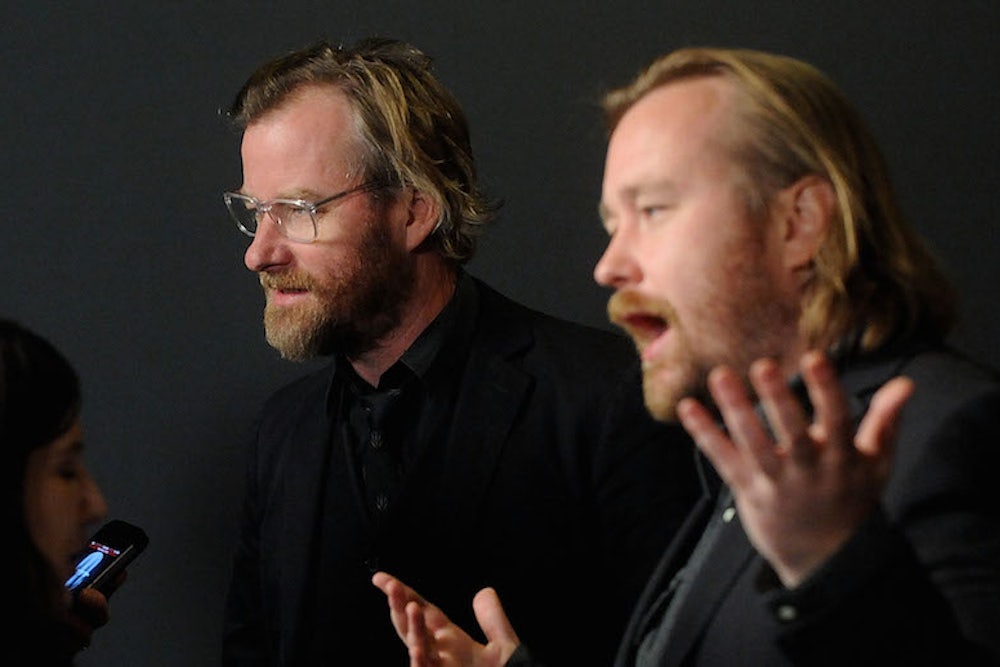Mistaken for Strangers, the 2013 documentary following The National, lifts its title from a song by the indie-rock band. It also aptly describes the relationship between the film’s director, Tom Berninger, and his brother, Matt Berninger, The National’s front man. Nine years apart in age, the two brothers are very, very different. There’s a moment in the film where the brothers are walking down a street in London. Tom, an affable metal-head on his first trip to Europe, points excitedly at double-decker busses while his older sibling Matt, cool in a dark suit and sunglasses, is continuously approached by fans. The only thing they seem to share is similar facial hair.
But perhaps that difference shouldn’t come as a surprise. Studies by psychologists like Frank Sulloway, author of Born to Rebel, show that a shared family experience isn’t what makes you similar, it’s what drives you to become unique.
“We tend to think of the family as this marvelously shared environment, and it’s not,” says Sulloway, a psychology professor at the University of California at Berkeley. Siblings become increasingly dissimilar as they compete to find their own niche within a family. To differentiate themselves, siblings go through a process called “deidentification,” in which they develop opposing personality traits. As Sulloway put it an essay for the academic anthology “The Evolution of Personality and Individual Differences,” as one child becomes introverted, over time, the other child becomes more extroverted. This is part of a conscious decision on the part of the siblings to differentiate themselves, making it harder for parents to compare their kids directly. Sulloway compares siblings to the finches chronicled by Charles Darwin. Only in this case they’re competing for parental affection and a special role within the family, not for grub on the Galápagos.
Of course, regardless of their attempted uniqueness, siblings will be compared to each other. A sibling is an obvious point of reference for any type of character assessment; look at the attention given to the differences between Prince William and Prince Harry (note the CNN headline “Cheeky Prince Harry vs dull brother Wills”). And to a certain extent, sibling differentiation has always been conventional wisdom—a variation of the birth-order-as-personality-driver thesis. Firstborns, Sulloway writes in Born to Rebel, are more correlated with traits that lend power and authority; they tend to be more socially dominant, ambitious, but yet still more defensive. Laterborns are known to be more rebellious, unconventional, and agreeable.
Yet while competition between siblings is a key determinant in personality development, a sibling’s role as an ally and advocate plays a large role in their development as well. “What happens with siblings is that they spend their lives competing with each other but they teach each other as well,” says Melissa Tafoya, an associate professor at La Sierra University. “Sibling relationships in particular are in constant, simultaneous love and hate. … That kind of simultaneous affection and support goes hand in hand with competition, conflict, and aggression.” In her 2012 study, Tafoya describes these concurrent emotions as “emotional ambivalence,” a way of experiencing relationships that is unique to siblings. “A hallmark of sibling relationships is that hostility and criticism are often accompanied by attachment and praise,” she writes.
Then there’s the role of friends in sibling differentiation, which some researchers argue is greater than family pressures. According to Dr. Tina Kretschmer, a postdoctoral research fellow at King’s College London, different friend groups play a huge factor in the development of different aspirations between siblings. In a 2010 paper, Kretschmer argues that her research is an important reminder that parents have less influence than we think. “Our findings might challenge traditional assumptions about the role of the family in the development of aspirations and values,” she writes. “Particularly in adolescence friends are an important social environment likely to shape and reinforce young people’s goals, aspirations, and values.”
In an off-the-cuff interview in Mistaken for Strangers, Tom tells Matt pointedly, “You are way more famous than any of my friends.” It’s another difference highlighted between them—like Tom’s preference for partying and his penchant for crying. So much of the film is Tom searching for and ultimately not finding an explanation for why he and his brother are so different. Perhaps he never should have started the search in the first place.
